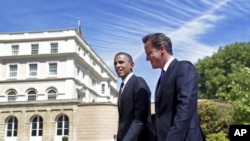U.S. President Barack Obama is in Britain with his wife Michelle on a state visit aimed at strengthening the longtime "special relationship" between Britain and the United States. At a news conference in London, Obama and Britain’s Prime Minister David Cameron said the relationship is special and essential.
During a joint news conference, Obama described the relationship as “stronger than it has ever been” and Cameron said the two men see “eye to eye” on a range of issues.
Analyst Xenia Dormandy, of the London-based research group Chatham House, said during the course of the past 15 years, the United States and Britain have, to some extent, taken one another for granted. She said they have not thought deeply enough about how to make the most out of their relationship.
But, she said, Obama’s state visit has shown that both sides realize they need to be more strategic about how they think about that bond.
"I think what you are seeing today, yesterday, is a change," said Dormandy. "You are seeing both sides wake up to the fact that if they want to achieve any of the objectives that they mutually hold, they need to do it in close collaboration. They need to work effectively together and that means they need to think strategically about their problems together, rather than doing so independently."
She said the United States is an economic and military powerhouse in a way that Britain is not. On the other hand, she said, Britain has some strong historical relationships with a number of countries that the United States does not. And Britain, she said, has so-called “soft power” that the United States might have been lacking in recent years.
"So what they need to work out is, 'Where is it that the U.K. can bring some of the soft power, some of the legitimacy to the table and work in conjunction with maybe America's economic strength and in terms of the military?'"
That kind of collaboration is important, she said, when trying to address a range of issues, including the ongoing war in Afghanistan, political upheaval in Middle East and North Africa, and the global economy.
London School of Economics International Relations Professor Michael Cox said the United States is increasingly working to build ties with emerging economies, namely in Asia. But he said that does not change the strong U.S. affinity with European countries.
"It is not just a partner, it is also a long standing ally," he said. "We are members of NATO, in the majority. We are members of the European Union, with which the United States has very good relations. We are democracies. We actually look at the world, if not exactly in an identical manner to an American President, this one in particular, but we look at it in broadly similar terms."
Cox said the United States’ reputation in Europe was hit during the presidency of George Bush, and Obama’s election was received with a certain sense of euphoria on the continent.
He said some have been disappointed, hoping Obama would, for example, take stronger action on climate change and exercise more “soft power.” Cox said the continued existence of Guantanamo Bay and the recent killing of Osama Bin Laden also were met with disappointment from some corners.
"I still feel there is a good degree of popular support for Obama amongst European and British publics," he said. "He would get very great receptions here, as he did in Ireland, and no doubt would do in France. As I said to other people in the United States, he might be more popular here in Europe than he is back in the United States, at least for some people."
This is Obama’s eighth trip to Europe as president.
Obama Trip to Britain Highlights His European Popularity




